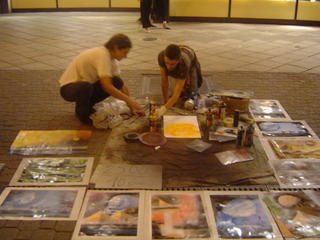This morning, on my way home from the grocery store, I managed to drop a newly purchased bottle of Tokaj wine on my left foot. As I was managing the outside door to the apartment, the elevator door, my groceries in my right hand and the bottle in the left, the bottle must have somehow slipped, bouncing on the cement floor into 1,367 shards of glass. Unfortunately I was wearing my somewhat new grass-bottomed flip-flops recently purchased at the lake. I looked down at my foot to see a pool of blood--unfortunately Tokaj is a white wine so the blood on my foot was not masked. I went upstairs, leaving a trail of blood drops behind, similar to when i smashed my toenail at my durham apartment about a month ago. i have since stopped the bleeding and cleaned up my mess, but all of this rendered me a bit incapacitated and out of three dollars (the cost of the wine). Unfortunately my digital camera was out of battery power so I couldnt take any lovely photos of the foot for your enjoyment--so you will have to use your imaginations---i now have no big toe nail (from moving day a month ago) and approximately 5 cuts of various sizes across the top of the foot. anyways, i should probably learn that perhaps i should not wear flip flops. After much soaking, i have managed to clean them up however, so I will adorn them once again when im feeling brazen and particularly coordinated.
anyways, since i spent most of the day hobbling about the apartment, I decided to write up some of my thoughts on the environment and hurricane katrina. somehow it became a little preachy in tone, and for that i apologize. im working on putting these thoughts together, and making it sound less academic and submitting as an editorial or something to newspapers. the target audience are folks that are not that informed about environmental issues. is the news media talking about the environment as a part of this tragedy? it is hard for me to tell from over here. im working on adding a secion on environment justice issues---the nexus of the environment, race and class, which is particularly relevant in the South and has been quite visible in this disaster. any comments, suggestions would be helpful.
anyways, feel free to read or ignore. going to go fix dinner. will write more tomorrow about life in hungary.
The Not-So-Natural Natural Disaster
While smoke spews across New Orleans, the recovery process continues. As the dikes and levees are repaired, while the incredibly unfortunate search in vain for their loved ones, relocate or rebuild, we, as a nation, must evaluate this disaster from a number of perspectives. The conversations will most likely focus on disaster relief, the inadequacies of FEMA, the lack of emergency preparedness and the vulnerability of the most marginalized in our society. While these are all valid concerns that must be addressed, we must not ignore in this discussion our relationship with the environment and the role this relationship has played in exacerbating this disaster. It remains to be seen how this dialogue will proceed and more specifically how this disaster may influence national, state and local environmental and climate policies.
Wetland Protection
The coastal wetlands of Louisiana (approximately 3 million acres) encompass approximately 40 % of the coastal wetlands of the United States, while it has been estimated that the state of Lousiana is losing 18,500 acres of wetlands per year (
http://marine.usgs.gov/fact-sheets/LAwetlands/lawetlands.html). This loss of wetlands represents approximately 80% of the total loss of wetlands across the United States. Not only do these wetlands provide habitat for aquatic species (including protection for the seafood industry in the region), and water quality protection, but wetlands also buffer the coastal regions from the impacts of hurricanes. Draining wetlands for agricultural, residential and commericial development reduces the area in which precipitation can be absorbed into the soil, increasing the volume and velocity of the water in streams and channels. This in turn increases the likelihood of flooding events. In addition, the channelization of the Mississippi River and its tributaries has reduced the natural seasonal flooding patterns that deliver sediments to the wetlands of the Mississippi delta, reducing the area and viability of the delta wetlands (
http://marine.usgs.gov/fact-sheets/LAwetlands/lawetlands.html).
In April of 2004, President Bush announced an initiative to increase the wetlands in the United States each year (
http://yosemite.epa.gov/opa/admpress.nsf/0/84e181a37019a07d85256e7e00750320?OpenDocument). From an ecological and economic perspective, we must encourage our administration, legislators, and local and state governments to carry out this initiative and increase wetland protection throughout the nation. Does it make more economic sense for us, as a nation, to spend our tax dollars on wetland protection or to pay the mitigating costs of the potential ecological impacts of lossed aquatic habitat, water quality degradation and increased flood and hurricane risk exposure? In addition, we must remind our administration that a national tally of wetland acreage doesnt necessarily capture the status of wetlands from either an ecological or economic standpoint (e.g., the Bush no net loss policy). It is highly feasible that we increase total wetland acreage across the nation while at the same time decrease the overall functional capacity of our wetlands. Dollars should be allocated at the national, state and local levels to adequately map and study the functionality of current wetlands and to analyze the function of new or restored wetlands. In addition, it becomes necessary for us as active citizens to become involved in local land use policy decisions—including flood plain zone development. We must ask the important questions in development decisions regarding the amount of loss of wetlands, the function of these wetlands, the location and predicted functionality of wetland mitigation projects (wetlands constructed to replace wetlands that are destroyed) and the populations (both human and non-human) most affected by loss of wetlands. Only by seeking the answers to these questions will we reach more environmentally, socially and economically sound development practices.
Update: Here are a couple of articles regarding wetlands and hurricane exposure on the gulf that I just found (after I wrote the entry above):
http://www.sciam.com/article.cfm?chanID=sa006&articleID=00060286-CB58-1315-8B5883414B7F0000http://www.cnn.com/2005/TECH/science/09/05/katrina.wetlands.ap/index.htmlClimate Change Policy
Questions have arisen in the media and elsewhere regarding the link between greenhouse gas accumulation, global climate change and hurricane occurence and strength. While it is nearly impossible to pin the effects of climate change on any one hurricane, scientists at our own National Oceanic and Atmospheric Administration have stated (
http://www.gfdl.noaa.gov/~tk/glob_warm_hurr.html):
"Although we cannot say at present whether more or fewer hurricane will occur in the future with global warming, the hurricanes that do occur near the end of the 21st century are expected to be stronger and have significantly more intense rainfall than under present day climate conditions. This expectation is based on an anticipated enhancement of energy available to the storms due to higher tropical sea surface temperatures. "
For a recent academic journal on the effects of global climate change on hurricane intensity and precipitation rates go to:
http://www.gfdl.noaa.gov/reference/bibliography/2004/tk0401.pdf.
To most of the world, the US climate change policy remains indignantly unscientific and unrealistic, generally denying that greenhouse emission accumulation and global climate change are issues that should be addressed. While increases in average global sea levels, a significant decrease in Arctic sea ice levels and increases in global mean temperatures have been documented and correlated with increases in the buildup of greenhouse gasses, the current administration refuses to recognize the validity of the science behind the findings. Per the request of President Bush, the U.S. National Academy of Sciences released a report on global climate change that concluded:
"Greenhouse gases are accumulating in Earth's atmosphere as a result of human activities, causing surface air temperatures and subsurface ocean temperatures to rise. Temperatures are, in fact, rising. The changes observed over the last several decades are likely mostly due to human activities, but we cannot rule out that some significant part of these changes is also a reflection of natural variability. Human-induced warming and associated sea level rises are expected to continue through the 21st century." (
http://books.nap.edu/books/0309075742/html/1.html)
However, the Bush administration continues to actively obfuscate the science behind climate change
http://query.nytimes.com/gst/abstract.html?res=F10710F6385C0C7B8CDDAF0894DD404482). The current Bush policy is based on the concept of greenhouse gas intensity---the level of CO2 emissions per GDP. While at first glance this may make some sense to tie CO2 limits to economic production, this policy allows for an increase in overall CO2 emissions through time, rendering the policy somewhat useless in managing long term climatic shifts (It has been projected that CO2 emissions will increase by 12% by the year 2o12 under the current policy (
http://www.pewclimate.org/policy_center/analyses/response_bushpolicy.cfm).
Fortunately, several mayors throughout the United States have taken the threat of global climate change more seriously (178 mayors as of August 30th including Columbus, Indiana and Durham, North Carolina) by declaring that climate change must be addressed. These cities will aim to meet the greenhouse gas emission reduction requirements of the Kyoto Protocol (the international agreement regarding greenhouse gas emissions reductions ratified by approximately 140 countries). In addition, Senators McCain and Leiberman have introduced the Climate Stewardship Act (S. 139), calling for a market based approach to greenhouse gas emission reduction, increased climate change research and the reduction of dependence of foreign oil. I strongly believe that it is our duty as US and world citizens to become informed about the issues of climate change, to assess our personal CO2 emission budgets (yes, I know, I own an SUV), and to discuss our policy concerns with local, state and federal government officials. We will only be able to determine the most appropriate climate change policy, both economically and environmentally, through an open national discussion based on findings from the scientific community. It is only through our own actions that we can address the long-term implications of our consumption and development patterns.
update: here's an interesting article in Fortune magazine regarding climate change, hurricanes and financial risk of climate change:
http://www.fortune.com/fortune/articles/0,15114,1101173,00.htmlupdate: a new article in science
"Changes in Tropical Cyclone Number, Duration, and Intensity in a
Warming Environment,"
By P. J. Webster, G. J. Holland, J. A. Curry, H.-R. Chang,
Science, September 16, 2005:










